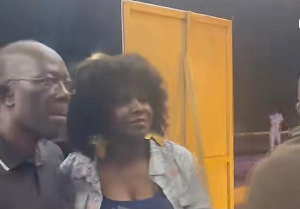- Home - News
- TWI News | TV
- Polls
- Year In Review
- News Archive
- Crime & Punishment
- Politics
- Regional
- Editorial
- Health
- Ghanaians Abroad
- Tabloid
- Africa
- Religion
- Election 2020
- Coronavirus
- News Videos | TV
- Photo Archives
- News Headlines
- Press Release
General News of Friday, 1 March 2002
Source: Chronicle
Tsikata's case: form triumphs over substance in chamber
There was nothing in the demeanor of the nine judges that gave a clue to the way they were going to rule after Prof E.V.O. Dankwa of the University of Ghana Law School gave a rather tortuous and unimpressive presentation for the better part of 75 minutes last Tuesday.
The venue was the stuffy interior of the Supreme Court buildings set close by the High Street of Accra, with tired giant fans caressing the air and making little difference to the room’s temperature.
The Chief Justice (CJ) Mr Wiredu, E.K. looked relaxed as always. Justice Kpegah, a veteran of the Supreme Court was pensive, as always. Justice Acquah appeared restless with the ding-dong argument of Prof Dankwa, whom the CJ fondly called ‘prof’, whenever he engaged him in a legal argument.
Ms Justice Sophia Akuffo appeared to have a lower tolerance threshold with the dueling, and betrayed a minimal snap in inflection as she pushed for direct answers to her lawyerly questions. On a number of occasions, she fanned herself with her fingers as the heat swirled around her.
It may have impacted on Mr Justice Acquah seated directly next to her. He had a more boisterous snap in his voice as he twirled his blue bic pen between his fingers. It appears blue bic pens were de rigeur for Supreme Court Judges.
If Mrs Joyce Bamford Addo was the only one who maintained elegant silence throughout - no questioning, no probing, no nothing. It may also be because she had a biro that was decidedly different. It was white. As white as her wig but not whiter than that of Mr Justice Atutuga’s. He was seated next to the more beefy Justice Adzoe, the latest entrant to the league of Supreme. Atutuga’s boyish countenance made one inquirer ask in hushed undertone, “who is that young man sitting in such auspicious company among those potentates?”
“Ssshh, that is Mr Justice Atutuga, and he has the power to change your destiny with the stroke of that thousand-cedi pen he is holding. On a still lighter note, the colour of the wigs or pens engaged my attention though they had nothing to do with Freedom and Justice.
The Chief Justice’s wig stood out in its sober yellowness. It had no significance or bearing whatsoever on the outcome, which, when it came later, shook the firmament and changed the political temperature of the day.
At the end of the day, the whole argument bore down to what is a fast track court. At the Castle, the seat of Government, there was a sense of crushing defeat. Some officials described the verdict as a coup, and began worrying about the wider implications of Mr Tsatsu Tsikata’s temporary victory.
“What are we going to tell the President,” one officer asked rhetorically. The political orientation of the judges became a subject of discussion elsewhere. Cold comfort as judges can never be removed unless they are found guilty of corruption or reach retirement age.
The impact is indeed huge and had already coursed its way to the international media. In a way, it could be interpreted with great difficulty to signify the consolidation of the growing perception of Ghana as a democratic country with an independent judiciary.
But at the baseline the remarks of one of the Supreme Court Justices His Lordship Mr Acquah had a poetic ring about it when he pointedly told Professor Dankwa, counsel to Mr Tsatsu Tsikata that “there is form and there is substance.” The whole matter appeared to have been the triumph of form over substance.










